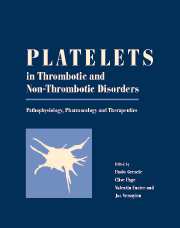Book contents
- Frontmatter
- Contents
- List of contributors
- Editors' preface
- PART I PHYSIOLOGY
- PART II METHODOLOGY
- PART III PATHOLOGY
- 34 Hereditary thrombocytopenias
- 35 Thrombocytopenias due to bone marrow disorders
- 36 Immune-mediated thrombocytopenia
- 37 Thrombocytopenia in childhood
- 38 Alloimmune thrombocytopenia
- 39 Drug-induced and drug-dependent immune thrombocytopenias
- 40 Thrombotic thrombocytopenic purpura and hemolytic uremic syndrome
- 41 Thrombocytosis and thrombocythemia
- 42 Platelet adhesive protein defect disorders
- 43 Congenital disorders of platelet secretion
- 44 Congenital platelet signal transduction defects
- 45 Acquired platelet function defects
- 46 Platelet storage and transfusion
- 47 Pathophysiology of arterial thrombosis
- 48 Platelets and atherosclerosis
- 49 Platelet involvement in venous thrombosis and pulmonary embolism
- 50 Gene regulation of platelet function
- 51 Platelets and bacterial infections
- 52 Interactions of viruses and platelets and the inactivation of viruses in platelet concentrates prepared for transfusion
- 53 Platelets and parasites
- 54 Platelets and tumours
- 55 Platelets and renal diseases
- 56 Platelets and allergic diseases
- 57 Platelet interactions with other cells related to inflammatory diseases
- 58 Platelets and the preimplantation stage of embryo development
- 59 Platelets in psychiatric and neurological disorders
- 60 Platelets in inflammatory bowel disease
- PART IV PHARMOLOGY
- PART V THERAPY
- Afterword: Platelets: a personal story
- Index
- Plate section
38 - Alloimmune thrombocytopenia
from PART III - PATHOLOGY
Published online by Cambridge University Press: 10 May 2010
- Frontmatter
- Contents
- List of contributors
- Editors' preface
- PART I PHYSIOLOGY
- PART II METHODOLOGY
- PART III PATHOLOGY
- 34 Hereditary thrombocytopenias
- 35 Thrombocytopenias due to bone marrow disorders
- 36 Immune-mediated thrombocytopenia
- 37 Thrombocytopenia in childhood
- 38 Alloimmune thrombocytopenia
- 39 Drug-induced and drug-dependent immune thrombocytopenias
- 40 Thrombotic thrombocytopenic purpura and hemolytic uremic syndrome
- 41 Thrombocytosis and thrombocythemia
- 42 Platelet adhesive protein defect disorders
- 43 Congenital disorders of platelet secretion
- 44 Congenital platelet signal transduction defects
- 45 Acquired platelet function defects
- 46 Platelet storage and transfusion
- 47 Pathophysiology of arterial thrombosis
- 48 Platelets and atherosclerosis
- 49 Platelet involvement in venous thrombosis and pulmonary embolism
- 50 Gene regulation of platelet function
- 51 Platelets and bacterial infections
- 52 Interactions of viruses and platelets and the inactivation of viruses in platelet concentrates prepared for transfusion
- 53 Platelets and parasites
- 54 Platelets and tumours
- 55 Platelets and renal diseases
- 56 Platelets and allergic diseases
- 57 Platelet interactions with other cells related to inflammatory diseases
- 58 Platelets and the preimplantation stage of embryo development
- 59 Platelets in psychiatric and neurological disorders
- 60 Platelets in inflammatory bowel disease
- PART IV PHARMOLOGY
- PART V THERAPY
- Afterword: Platelets: a personal story
- Index
- Plate section
Summary
Fetal and neonatal alloimmune thrombocytopenia (AIT) is the most common cause of severe thrombocytopenia in fetuses and neonates. Maternal IgG alloantibodies against paternally derived fetal platelet antigens cross the placenta early in pregnancy and commonly result in severe thrombocytopenia. While the reported incidence varies somewhat with the assigned threshold of thrombocytopenia (50, 100, or 150 × 109/l), in most unselected populations, AIT affects 1 in 1000 to 1 in 2000 live births. Table 38.1 contains recent studies of AIT in unselected populations, systematically screened. In its severe form, AIT has the potential for significant morbidity (including intracranial hemorrhage) and mortality. In milder forms, there are either antibodies with no thrombocytopenia, or mild to moderate thrombocytopenia, which is identified only by a complete blood count obtained for another indication or in a screening study. While there have been extensive efforts made in the diagnosis and characterization of the disease, strategies for early detection and intervention remain controversial.
Pathogenesis
There are three requisite components of the pathogenesis of AIT. First, there must be an incompatibility between maternal and fetal ‘platelet-specific’ antigens, which are inherited from the father. The second requirement, alloimmunization, is a maternal humoral immune response specific to these ‘foreign’ fetal platelet antigens. Finally, maternal anti-platelet IgG alloantibodies must cross the placenta, bind to fetal platelet antigens, and cause fetal platelet destruction with resultant thrombocytopenia.
- Type
- Chapter
- Information
- Platelets in Thrombotic and Non-Thrombotic DisordersPathophysiology, Pharmacology and Therapeutics, pp. 569 - 583Publisher: Cambridge University PressPrint publication year: 2002



